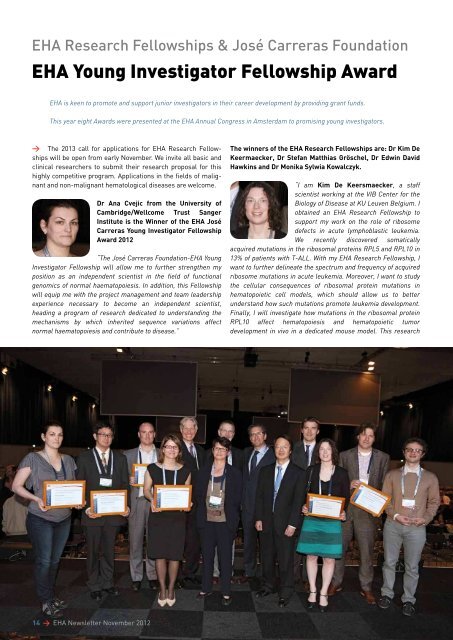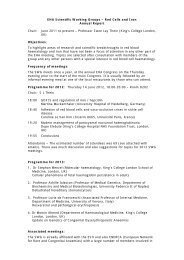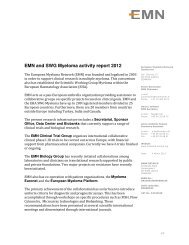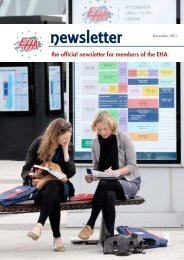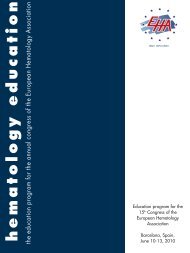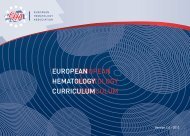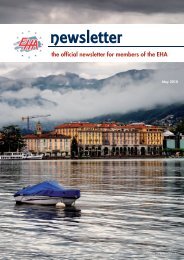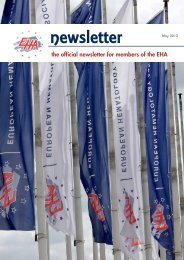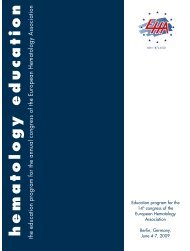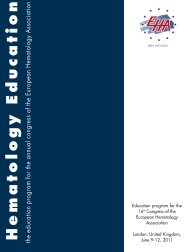Newsletter May 2012 - European Hematology Association
Newsletter May 2012 - European Hematology Association
Newsletter May 2012 - European Hematology Association
Create successful ePaper yourself
Turn your PDF publications into a flip-book with our unique Google optimized e-Paper software.
EHA Research Fellowships & José Carreras Foundation<br />
EHA Young Investigator Fellowship Award<br />
EHA is keen to promote and support junior investigators in their career development by providing grant funds.<br />
This year eight Awards were presented at the EHA Annual Congress in Amsterdam to promising young investigators.<br />
> The 2013 call for applications for EHA Research Fellowships<br />
will be open from early November. We invite all basic and<br />
clini cal researchers to submit their research proposal for this<br />
highly competitive program. Applications in the fields of malignant<br />
and non-malignant hematological diseases are welcome.<br />
Dr Ana Cvejic from the University of<br />
Cam bridge/ Wellcome Trust Sanger<br />
Institute is the Winner of the EHA José<br />
Carreras Young Investigator Fellowship<br />
Award <strong>2012</strong><br />
“The José Carreras Foundation-EHA Young<br />
Investigator Fellowship will allow me to further strengthen my<br />
position as an independent scientist in the field of functional<br />
genomics of normal haemato poiesis. In addition, this Fellowship<br />
will equip me with the project management and team leadership<br />
experience necessary to become an independent scientist,<br />
heading a program of research dedicated to understanding the<br />
mechanisms by which inherited sequence variations affect<br />
normal haematopoiesis and contribute to disease.”<br />
14 > EHA <strong>Newsletter</strong> November <strong>2012</strong><br />
The winners of the EHA Research Fellowships are: Dr Kim De<br />
Keermaecker, Dr Stefan Matthias Gröschel, Dr Edwin David<br />
Hawkins and Dr Monika Sylwia Kowalczyk.<br />
“I am Kim De Keersmaecker, a staff<br />
scientist working at the VIB Center for the<br />
Biology of Disease at KU Leuven Belgium. I<br />
ob tained an EHA Research Fellowship to<br />
support my work on the role of ribosome<br />
defects in acute lymphoblastic leukemia.<br />
We recently discovered somatically<br />
acquired mutations in the ribosomal proteins RPL5 and RPL10 in<br />
13% of patients with T-ALL. With my EHA Research Fellowship, I<br />
want to further delineate the spectrum and frequency of acquired<br />
ribosome mutations in acute leukemia. Moreover, I want to study<br />
the cellular consequences of ribosomal protein mutations in<br />
hematopoietic cell models, which should allow us to better<br />
understand how such mutations promote leukemia development.<br />
Finally, I will investigate how mutations in the ribosomal protein<br />
RPL10 affect hematopoiesis and hematopoietic tumor<br />
development in vivo in a dedicated mouse model. This research<br />
may result in therapeutically relevant results, since understanding<br />
of the oncogenic mechanisms of ribosome defects in<br />
cancer cells could identify potential targets for therapy for<br />
patients with ribosome defective leukemias. Moreover, the mouse<br />
model we will establish may turn out to be very useful for testing<br />
of candidate drugs for ribosome defective leukemias. It was via<br />
my mentor and through attending the annual EHA conferences<br />
that I became aware of the EHA Research Fellowship program. I<br />
am very grateful for this fellowship since it is welcome recognition<br />
of our work and gives more visibility to our discovery of ribosome<br />
mutations in T-ALL. The fellowship money also directly supports<br />
further continuation of our research on this topic and will facilitate<br />
acquisition of additional funding, allowing the establish ment<br />
of a small research team focused on exploring the role of<br />
ribosome defects in leukemia and cancer in general.”<br />
“My name is Stefan Gröschel and I am<br />
honoured to be one of the selected<br />
Fellowship recipients. Having previously<br />
worked as an MD and research fellow at<br />
the Dept. of <strong>Hematology</strong> of the University<br />
Hospital of Ulm (Head: Professor Döhner) I<br />
moved to Rotterdam in July 2011 to embark<br />
on my research project titled “Deregulation of EVI1 in myeloid<br />
malignancies with inv(3)/t(3;3)” under the lead of Professor Ruud<br />
Delwel at the Erasmus University Medical Center. In this project<br />
we aim to understand the genetic events leading to aberrant<br />
activation of the proto-oncogene EVI1 being the molecular<br />
characteristic of an aggressive type of acute myeloid leukemia<br />
with chromosome 3q rearrangements. We plan to achieve this in<br />
a stepwise approach by first identifying regulatory genomic<br />
regions critical for the transcriptional control of the EVI1. To this<br />
end, we have studied the genomic environment of EVI1 using<br />
RNA-seq, target locus capture and chromosome confirmation<br />
capture (4C) followed by next-generation sequencing. In the<br />
following two years, our next main goals are the functional<br />
validation of candidate regions and the attempt to characterize<br />
the transcription factor complex involved in activation of the EVI1<br />
locus in myeloid malignancies with inv(3)/t(3;3). With the two-year<br />
funding from the EHA Research Fellowship I have the unique<br />
opportunity to realize this interesting and challenging program.<br />
Since the EHA Fellowship is a well-recognized grant in<br />
<strong>Hematology</strong>, suited to junior clinicians and researchers at the<br />
beginning of their scientific career, I was encouraged to apply for<br />
the program by my mentor as well as previous colleagues who<br />
have received this distinguished award. The fellowship will be of<br />
great value and motivation to complete my objectives in the lab<br />
and will help open doors to apply for future projects funded from<br />
other institutional and public grants.”<br />
“My name is Edwin Hawkins originally<br />
from the Peter MacCallum Cancer Centre,<br />
Melbourne, Australia. Through the EHA<br />
Young Investigator Fellowship I have<br />
relocated to Imperial College London,<br />
United Kingdom to conduct research on my<br />
project “In vivo imaging of Notch-1 driven<br />
T-ALL interaction with the bone marrow microenvironment”. The<br />
focus of this project is to address the cellular mechanisms that<br />
cause relapse of T cell acute lymphoblastic leukaemia (T-ALL).<br />
Although T-ALL patients initially respond well to treatment, longterm<br />
prognosis is poor due to relapsed disease, which is often<br />
refractory to initial therapies. Notably, the failure to eliminate<br />
minimal residual disease in the bone marrow identifies patients<br />
at a very high risk of disease relapse.The interaction of leukaemia<br />
with the bone marrow microenvironment has gained increasing<br />
attention as specific niches may be able to provide mechanisms of<br />
drug resistance, quiescence, and self-renewal in the same way<br />
that has been demonstrated for haematopoietic stem cells. Using<br />
novel in vivo time-lapse imaging, we will examine the relationship<br />
between T-ALL and the microenvironment at various disease<br />
stages with a particular focus on cells responsible for disease<br />
relapse. I learnt about the EHA young investigator fellowship<br />
through colleagues in the hematology field and via circulated<br />
newsletters as a result of my EHA membership. The vision of the<br />
EHA to provide funding that promotes international relocation<br />
within Europe was my main reason for applying to the scheme.<br />
The financial support provided by the EHA young investigator<br />
fellowship will enable me to focus on my research and help me<br />
achieve my overall goal, which is to increase the quality of life of<br />
cancer patients. Additionally, the support provided by the EHA<br />
through scientific meetings and educational programs has<br />
enabled me to form strong networks within Europe. I hope to use<br />
this as a platform to increase inter-institutional scientific<br />
collaborations, and in turn, increase research output. I believe<br />
that the interaction of multiple high quality research groups,<br />
united by common goal to cure cancer, is essential for our<br />
chances of winning this battle.”<br />
“My name is Monika S. Kowalczyk and I<br />
am one of this year’s winners of The EHA<br />
Research Fellowship. I have recently joined<br />
the Computational Biology Laboratory lead<br />
by Dr Aviv Regev at The Broad Institute of<br />
MIT and Harvard (Cambridge, USA) and am<br />
embarking on a large-scale study to<br />
decipher the chromatin regulatory circuits of mammalian hemato<br />
poiesis in order to understand and treat leukemia. Such a<br />
systems biology approach will integrate gene expression profiling<br />
with epigenomics data and systematic functional screens by RNAi<br />
and has huge potential to reveal novel disease mechanisms and<br />
discover new targets for drug application. Current technologies<br />
give us fantastic opportunities to begin unravelling how biological<br />
decisions are made in health and disease from a systemic point of<br />
view. With the advancements in tools and knowledge, a detailed<br />
understanding of mammalian cell circuits is achievable and the<br />
time is right for me to tackle the circuits of human hemato poiesis.<br />
Creating a complete catalog of cell circuitry within human<br />
hematopoiesis will pave the way to the manipulation and<br />
reprograming of these circuits and ultimately have a huge impact<br />
on our ability to understand and treat diseases like leukemia.<br />
I received a MD degree in Poland, and a DPhil in molecular<br />
hematology from the University of Oxford (UK). My DPhil research<br />
has provided me with important expertise at studying the<br />
interface between cell differentiation and regulatory mechanisms<br />
and my medical training underlies my passion to apply these in a<br />
translational context. This EHA award allowed me to enter one of<br />
the finest academic communities (MIT and Harvard) and<br />
importantly funds the research which I will carry out. This unique<br />
opportunity will give me knowledge, skills and competence to<br />
pursue my scientific interests independently as a group leader.”<br />
Dr Lucia Stefanini is this year’s recipient of the EHA-ISTH Joint<br />
Fellowship. The award of EUR 72,000 over two years is intended<br />
to support the study of the physiology of bleeding,<br />
coagulation or thrombosis. Dr Stefanini’s proposal, Fine-tuning<br />
EHA <strong>Newsletter</strong> November <strong>2012</strong> > 15


